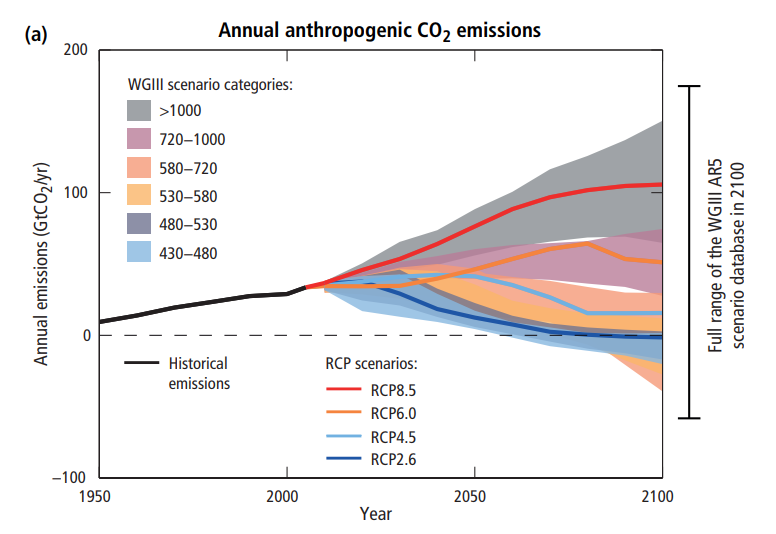Some quick math: The world emits about 30-40B tons of CO2 each year. The 2014 IPCC graph from their "Summary for Policymakers" shows both historical emissions and anticipated future emissions for several different CO2 mitigation strategies. .
The precise details aren't important: What is important is that we need to return to 1990 levels of emissions to avoid the tipping point. This is, roughly, 60% of the current levels of emissions.
This is easier said than done, because it doesn't mean the Western world just needs to cut back back 40% and the problem will be solved. The problem is much more difficult because we have a few billion people entering a modern economy in both India and China. And they will expect the comforts that come with a middle class income, including travel by car and airplanes and climate control.
What is your "fair share" of CO2?
So, if we need to roll back to 1990 levels, and 1990 levels were roughly 22GT CO2/year and we have 7B people on the planet that will expect to emit equally, then what is our per-capita fair share?
The math is easy: 22GT/7B = 3.1 Tons per person per year. The USA today is around 16.5 tons per year, which means an 80% reduction. The EU is 6.9, which means a 50% reduction. And India is currently at 1.8, which means a 2X expansion.
Putting this into context, a single round trip coach flight from Seattle to Paris is about 3 tons of CO2. That is your entire allocation of CO2 for the year. How many in the top 1% are willing to forego their annual overseas holiday? Not many, I suspect. Of course, they will happily recycle and might even drive an electric car. But that doesn't really solve the problem.
Air travel can be done with biofuels, of course. These fuels still emit CO2, but they since they were recently "harvested" from captured CO2, then net adder to the atmosphere is low. And scaling this and performing whatever retrofits might be needed in the next few decades seems unlikely.
What about carbon markets?
Carbon markets value carbon at roughly $25/ton today, though they are rarely applied. That means that the cost offset your flight to Paris would be about $75. At that price, nobody would NOT take a trip to Paris for vacation. They'd just be a bit more frugal once they arrived.
If you want to know what price carbon must be to actually work, then ask yourself how much of a cost add YOU would bear to NOT do an optional activity. If you were focused on deals, a trip to Paris for a week for 2 might cost $500 per person in airfaire, $70/person per might in hotels, and $50/day per person in spending. Maybe $1100 at the low end, and maybe $3000 for a fancier experience. A carbon tax should add a sizable premium to the experience. $500 to $1000 or so. In other words, it needs to be 10X where it's set today. And only then we you start to see behavior modified to the point required.
Otherwise, carbon taxes are nothing more than modern indulgences.
Update Dec 2018: France was to implement a nearly $40/ton carbon tax, which was to manifest as a $0.30/gallon gas tax. Riots ensued. The tax was repealed for now. Note that $40/ton was the STARTING point. Earlier this year, the IPCC claimed (see page 2-79) it would require a 2030 carbon tax from $200 to $5500 (2010 dollars) to put the world onto a sure path to limiting temp rise by 1.5C ($5500/ton) or 2C ($200/ton). A recurring them in all the IPCC tax estimates is that it costs a lot to limit temps. That is, it roughly costs 10X more in carbon taxes to limit temps to 2C instead of 1.5C.
The summary for December, 2018 is such: France attempted to implement a carbon tax that was a small fraction of what would be required to hit 2030 targets, and the country revolted.
Changing behavior via taxes will be very difficult, because the taxes required to change the behavior will be very high. The change in behavior will be better accomplished by making the low-carbon technology better. And once that occurs, consumers will switch happily. A case could be made for taking carbon taxes and applying those to an “X-Prize” for development of the new technology, but governments will be loath to pass up the new money generated by carbon taxes.
The pieces are falling into place such that the game will be largely unwinnable given the constraints.
